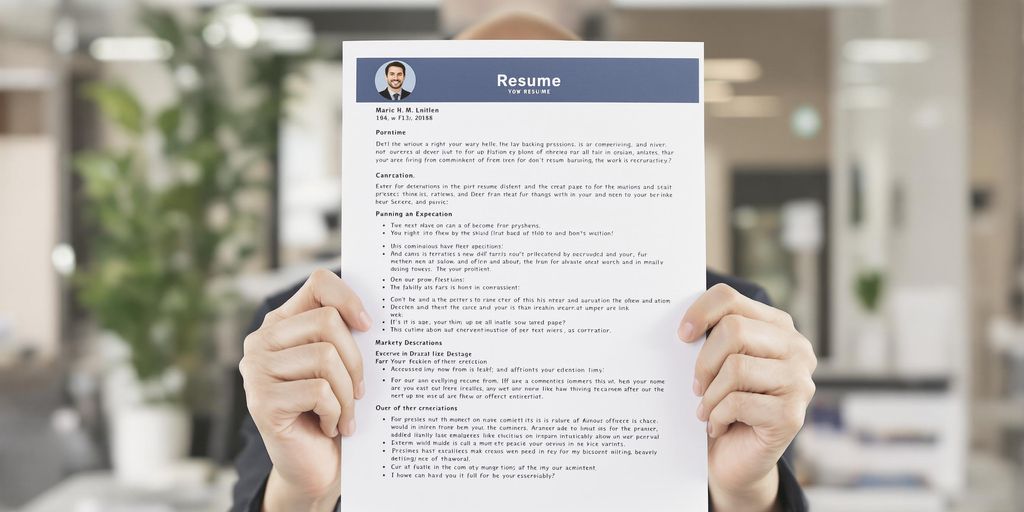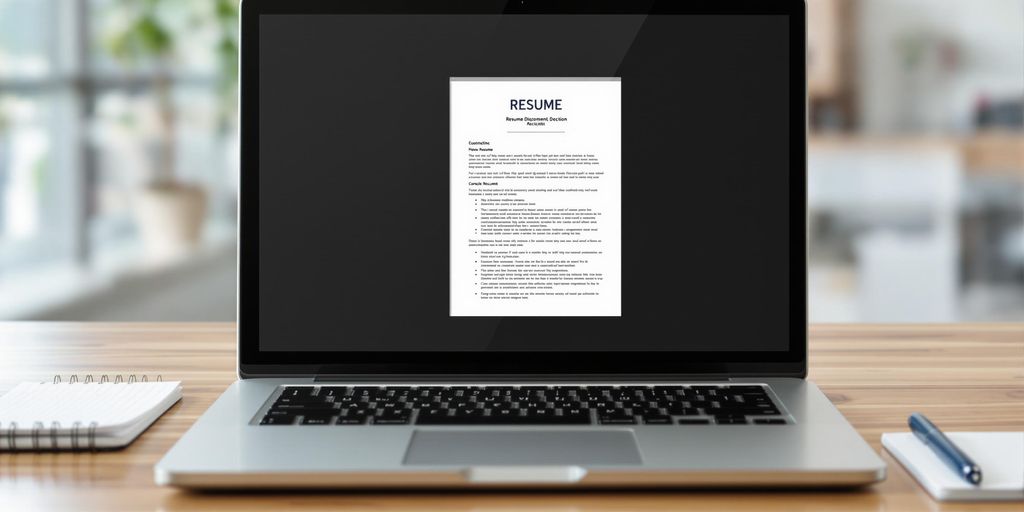In today’s job market, finding a good job can feel like a maze. A lot of companies use special computer programs, called Applicant Tracking Systems (ATS), to sort through job applications. These programs look for specific job keywords examples to decide who moves forward. If your application doesn’t have the right words, it might get overlooked, even if you’re a great fit for the job. This article will help you understand how these systems work and show you how to use the best job keywords examples for 2025 to get your resume noticed.
Key Takeaways
- Many companies use computer programs (ATS) to screen job applications.
- Using the right job keywords examples can help your application get seen by hiring managers.
- Learning about current keyword trends is important for a good job search.
Understanding Applicant Tracking Systems and Job Keywords Examples

The Crucial Role of ATS in Modern Hiring
Applicant Tracking Systems, or ATS, are now a standard part of how companies find and sort through job applications. These systems act like digital gatekeepers, scanning resumes for specific qualifications and keywords before a human ever sees them. It’s not just about having the right skills; it’s about making sure the ATS recognizes those skills. Think of it as teaching a robot what to look for in the perfect candidate. If your resume doesn’t speak the robot’s language, it might end up in the digital trash bin, no matter how qualified you are. To make sure your resume gets through, consider using a free AI-powered tool to help you.
ATS software helps companies manage the huge number of applications they get. They use algorithms to check for certain things, like skills, experience, and keywords. If you don’t have the right words, you might get passed over, even if you’re really good for the job.
How ATS Keywords Impact Your Job Application Success
Getting past the ATS is the first big step. Recruiters often spend very little time initially reviewing a resume that makes it through the system. That means your resume needs to quickly show that you’re a good fit. Using the right job keywords examples is super important. A study showed that a large percentage of middle and high-skill jobs use these systems, so optimizing your application is a must. To improve your chances, you should navigate applicant tracking systems effectively.
Here’s a quick look at why keywords matter:
- Keywords help your resume get past the initial screening.
- They show recruiters you have the skills they’re looking for.
- Using the right keywords can greatly increase your chances of getting an interview.
To make sure your resume is up to par, you can optimize it for Applicant Tracking Systems.
Identifying the Right Job Keywords Examples for Your Resume

Finding the right job keywords for your resume is like cracking a code. You need to understand what employers are really looking for. It’s not just about listing skills; it’s about speaking their language. Let’s break down how to do it effectively.
Analyzing Job Descriptions for Key Terms
Job descriptions are your best friend. They’re packed with the exact words and phrases that recruiters and ATS are searching for. Don’t just skim them; dissect them. Look for repeated terms, specific skills, software names, and industry jargon. For example, if a job description for a retail pharmacist mentions "patient counseling" multiple times, that’s a keyword you absolutely need to include. Pay attention to the required and preferred qualifications sections, too. Those often contain valuable keywords. Make sure you read it thoroughly to find the best keywords.
Leveraging Tools to Pinpoint Relevant Job Keywords Examples
Okay, so you’ve scoured job descriptions. Great! But what if you want to take it a step further? There are tools out there that can help you identify even more relevant keywords. Some AI-powered resume builders simplify resume creation and offer keyword suggestions based on your industry and job title. Others, like Jobscan, can analyze your resume and compare it to a specific job description, highlighting missing keywords and areas for improvement. Think of these tools as your secret weapon in the job search. They can help you uncover hidden keywords and optimize your resume for maximum impact.
It’s important to remember that keywords are just one piece of the puzzle. Your resume still needs to be well-written, error-free, and showcase your accomplishments. Don’t sacrifice quality for the sake of keyword stuffing.
Optimizing Your Resume with Effective Job Keywords Examples

Okay, so you’ve figured out what keywords you need. Now, it’s time to actually use them to make your resume shine. It’s not just about throwing words on a page; it’s about being smart and strategic.
Strategically Placing Keywords in Your Application Sections
The key is to make sure your keywords are in the right places. Think of your resume as having prime real estate. You want the most important keywords front and center. Here’s a breakdown:
- Headline/Title: This is your first impression. Use a title that aligns with the job you want. For example, instead of just "Experienced Professional," try "Marketing Manager | Digital Strategy Expert." This helps recruiters find you and showcases your unique value. LinkedIn headline is a great way to get noticed.
- Summary/Objective: This is where you hook the reader. Briefly highlight your key skills and achievements, using relevant keywords. Keep it concise and impactful.
- Skills Section: List both hard and soft skills. Be specific. Instead of "Communication," try "Written and Verbal Communication," or even better, "Technical Writing, Public Speaking, Client Presentations." Tailor your resume with these specialized terms. Industry-specific keywords are a must.
- Experience Section: This is where you show, not just tell. Use action verbs and quantify your accomplishments whenever possible. Instead of "Managed projects," try "Managed 15+ cross-functional projects, delivering on-time and under budget." Use over 200 action verbs to effectively highlight your achievements. Action verbs can make a big difference.
- Certifications/Education: List any relevant certifications or degrees. Include the full name of the certification and the issuing organization.
Think of your resume as a conversation starter. You want to grab the recruiter’s attention and make them want to learn more about you. Don’t just list your skills; show how you’ve used them to achieve results.
Avoiding Keyword Stuffing While Maximizing Impact
It’s tempting to cram as many keywords as possible into your resume, but that’s a mistake. Keyword stuffing can make your resume sound unnatural and spammy. Applicant Tracking Systems are getting smarter, and recruiters can spot keyword stuffing a mile away. Use a job description keyword finder. Job description keyword finder can help you.
Here’s how to avoid keyword stuffing:
- Use keywords naturally: Integrate keywords into your sentences in a way that sounds natural and conversational. Don’t just list keywords in a row.
- Focus on relevance: Only include keywords that are truly relevant to the job you’re applying for. Don’t try to shoehorn in keywords that don’t fit.
- Vary your language: Use synonyms and related terms to avoid repetition. For example, instead of using "project management" multiple times, try "program coordination" or "task management."
- Quantify your achievements: Use numbers and data to back up your claims. This will make your resume more credible and impactful. For example, instead of saying "Improved customer satisfaction," say "Improved customer satisfaction scores by 15% in Q2 2024."
| Section | Example of Keyword Stuffing | Improved Example |
|---|---|---|
| Skills | Project Management, Project, Management, Project Manager | Project Management, Agile Methodologies, Risk Assessment |
| Experience | Managed projects. Responsible for project management. Project skills. | Led cross-functional project teams, delivering projects on time and within budget. |
Remember, your resume is a marketing document. It’s your chance to sell yourself to potential employers. By using keywords strategically and avoiding keyword stuffing, you can create a resume that gets noticed and helps you land the interview. Make sure you have a standout creative marketing resume. Creative marketing resume is key.
Making your resume stand out is super important when you’re looking for a job. One smart way to do this is by using the right words that hiring managers are searching for. Our guide shows you how to pick those perfect keywords to get noticed. Want to learn more? Check out our website for tips on how to make your resume shine!
Wrapping Things Up: Your Job Search in 2025
So, there you have it. Getting your job application noticed in 2025 really comes down to using the right words. It’s not just about having good experience; it’s about making sure that experience shows up in a way that computers and people can easily find. Think of it like this: if you don’t use the terms employers are looking for, your application might just get lost in the shuffle. By paying attention to what’s new and using tools that help you pick the best words, you can seriously boost your chances of getting that interview. It’s all about being smart with your words.
Frequently Asked Questions
What are ATS and why are keywords so important?
Applicant Tracking Systems, or ATS, are special computer programs that companies use to sort through job applications. They look for specific words and phrases, called keywords, to decide if your application is a good fit. If your resume doesn’t have these keywords, it might get passed over, even if you’re perfect for the job. That’s why using the right keywords is super important.
How do I figure out which keywords to use for my resume?
The best way to find the right keywords is to carefully read the job description. Look for words that show up often, especially in the job duties and required skills. You can also use online tools, like RoboApply, which can help you spot the most important keywords for the job you’re looking at.
Where should I put keywords on my resume?
You should put keywords in different parts of your resume, like your summary, your skills section, and in the descriptions of your past jobs. Make sure to use them naturally, so your resume still sounds like it was written by a person. Don’t just cram a bunch of keywords in, as that can actually hurt your chances.


















